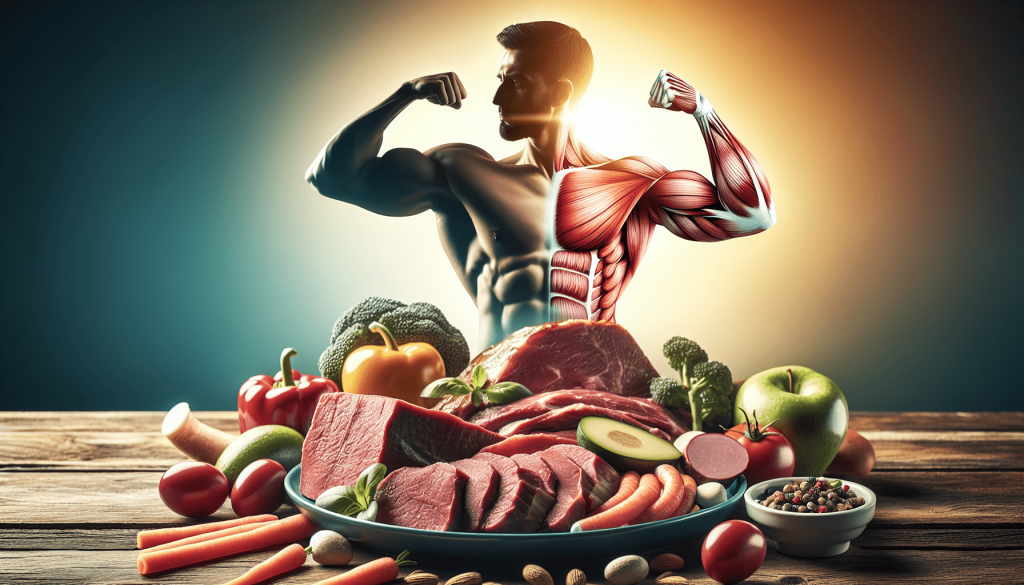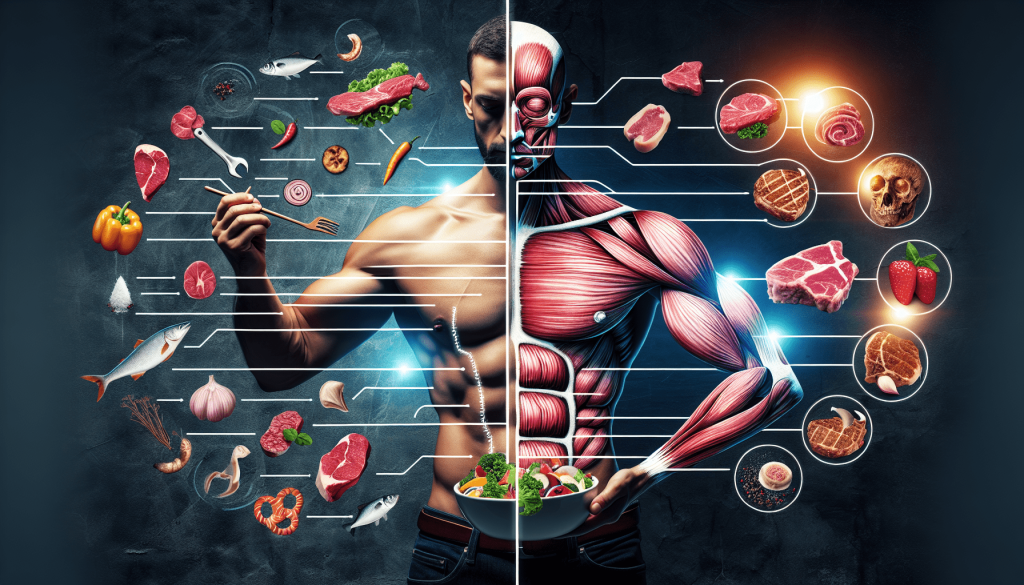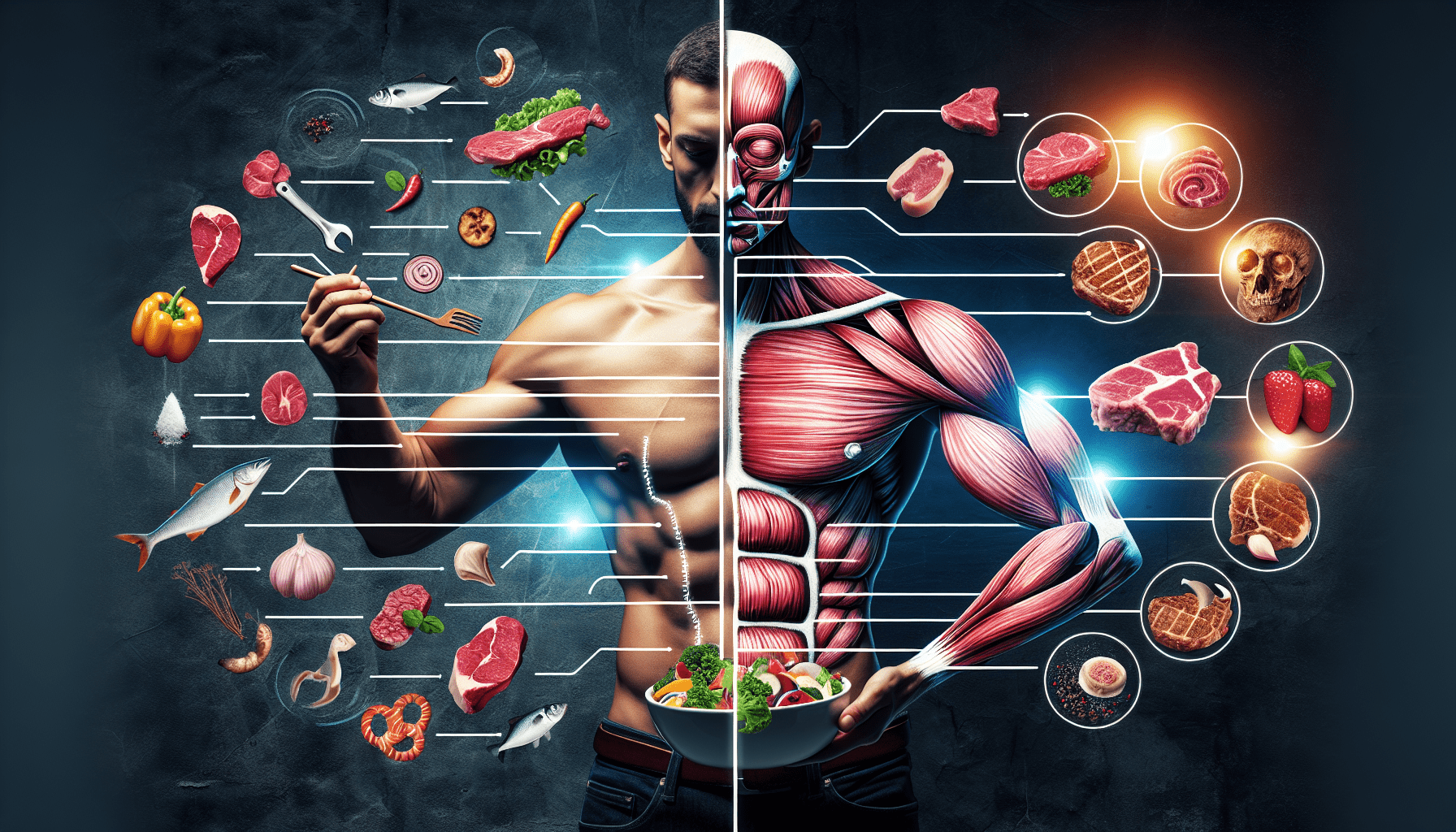In this comprehensive guide, you will discover the best strategies to maintain your hard-earned muscle mass while following the Carnivore Diet. Whether you’re a seasoned practitioner of this meat-centric way of eating or just curious to explore its benefits, we’ve got you covered. With expert tips and practical advice, you’ll learn how to fuel your body with the right nutrients and optimize your training routine to ensure that you not only stick to the Carnivore Diet, but also preserve your lean muscle mass. Say goodbye to any concerns about losing gains – this guide will equip you with all the knowledge you need to thrive on the Carnivore Diet.

1. Understand the Carnivore Diet
What is the Carnivore Diet?
The Carnivore Diet is a type of eating plan that primarily consists of animal products. It involves eliminating all plant-based foods, including grains, fruits, vegetables, and even carbohydrates. The main focus of this diet is to consume a high amount of protein and fat from animal sources such as meat, fish, eggs, and dairy.
Benefits of the Carnivore Diet
One of the main benefits of the Carnivore Diet is its potential to support muscle mass maintenance. By consuming a high amount of protein, which is essential for muscle growth and repair, individuals on this diet may experience improved muscle composition. Additionally, as the diet eliminates most potentially inflammatory foods, it may help reduce inflammation in the body, aiding in muscle recovery and overall performance.
Potential drawbacks of the Carnivore Diet
While the Carnivore Diet may have its benefits, it is important to consider potential drawbacks as well. Since this diet eliminates fruits, vegetables, and other plant-based foods, it may lead to nutrient deficiencies in certain vitamins, minerals, and fiber. It is vital to ensure that you are obtaining all the necessary nutrients and micronutrients through careful planning and supplementation if necessary. It is also worth noting that the long-term effects of the Carnivore Diet are not yet fully understood, and it is essential to listen to your body and consult with healthcare professionals if you have any concerns.
2. Set Your Protein Intake
Importance of protein for muscle maintenance
Protein is a crucial component of maintaining and building muscle mass. It provides the essential amino acids that our bodies need for muscle repair and growth. Without sufficient protein intake, the body may struggle to recover and regenerate muscle tissue, impeding progress in muscle maintenance.
Calculating your protein requirements
To determine your protein requirements on the Carnivore Diet, it is recommended to consume approximately 0.6-1 gram of protein per pound of lean body mass. Lean body mass refers to your total weight minus your body fat percentage. This range ensures you are consuming enough protein to support muscle maintenance without overconsuming excessive amounts.
Determining the optimal protein intake on the Carnivore Diet
It is important to find the optimal protein intake that works best for your body and goals. Some individuals may thrive with higher protein intakes, while others may require slightly less. Experimentation and listening to your body’s cues are essential in finding the right balance between protein intake and muscle maintenance. Keep in mind that meeting your protein needs through a variety of animal sources will ensure you receive a broad range of essential amino acids.
3. Prioritize Nutrient-Dense Foods
Choosing the right sources of animal protein
When following the Carnivore Diet, it is crucial to prioritize nutrient-dense sources of animal protein. Opt for high-quality, pasture-raised, and grass-fed meats, as they tend to contain higher levels of nutrients such as omega-3 fatty acids, vitamins, minerals, and antioxidants. Look for cuts of meat that are lean and contain a good balance of protein and fat for muscle maintenance.
Including nutrient-rich organ meats
Incorporating organ meats into your Carnivore Diet can provide a significant nutrient boost. Organ meats, such as liver, heart, and kidney, are incredibly nutrient-dense, containing high levels of vitamins A, D, E, K, B vitamins, iron, zinc, and essential fatty acids. These nutrients play a vital role in supporting muscle maintenance and overall health. Aim to include organ meats in your diet regularly, either by consuming them directly or through supplements.
Incorporating fish and seafood into your diet
Fish and seafood are excellent additions to the Carnivore Diet, as they provide essential nutrients such as omega-3 fatty acids, iodine, selenium, and high-quality protein. These nutrients are crucial for muscle maintenance, overall health, and optimal hormonal balance. Including fatty fish like salmon, mackerel, and sardines can provide an extra dose of omega-3 fatty acids, which have anti-inflammatory properties that support muscle recovery.
4. Ensure Sufficient Fat Intake
Importance of dietary fat on the Carnivore Diet
While protein is essential for muscle maintenance, dietary fat also plays a crucial role in supporting overall health, hormonal balance, and muscle recovery. It is important to consume enough fat on the Carnivore Diet to provide energy, promote satiety, and support the absorption of fat-soluble vitamins. Additionally, dietary fat contributes to the optimal functioning of vital organs, joint health, and the production of important hormones.
Choosing healthy sources of fat
To ensure sufficient fat intake on the Carnivore Diet, choose healthy sources of fat such as animal fats, including tallow and lard, and naturally fatty cuts of meat. Eggs, fatty fish, and high-quality dairy products like butter and cream can also provide a good amount of healthy fats. It is important to source these fats from pastured and grass-fed animals whenever possible, as they tend to have a higher nutrient profile.
Finding the right balance between protein and fat
Maintaining the right balance between protein and fat is key when it comes to muscle maintenance on the Carnivore Diet. While protein is important for muscle growth and repair, consuming excessive amounts can hinder your body’s ability to utilize fat as a fuel source. Finding the right balance, based on your individual needs and goals, is crucial for optimal muscle maintenance and overall health. Experimentation and paying attention to how your body responds are key in achieving this balance.

5. Stay Hydrated
The importance of hydration for muscle maintenance
Proper hydration is essential for overall health and plays a significant role in maintaining muscle mass. Water is involved in numerous physiological processes, including protein synthesis and nutrient transport to muscles. Being adequately hydrated can help optimize muscle recovery, reduce the risk of muscle cramps, and improve overall exercise performance.
Recommended water intake on the Carnivore Diet
There is no one-size-fits-all recommendation for water intake, as individual hydration needs vary based on factors such as body weight, activity levels, and climate. However, as a general guideline, aim to consume at least 0.5-1 ounce of water per pound of body weight daily. For example, someone weighing 150 pounds should consume 75-150 ounces of water per day. Adjust your water intake based on your individual needs, activity levels, and any specific circumstances that may increase your fluid requirements.
Tips for staying hydrated
To ensure you stay hydrated while following the Carnivore Diet, consider the following tips:
- Carry a water bottle with you at all times to make it easy to sip water throughout the day.
- Set reminders to drink water at regular intervals.
- Monitor the color of your urine; pale yellow indicates proper hydration.
- Consume hydrating foods, such as broths and soups, which can provide additional fluids.
- Limit the consumption of dehydrating substances like caffeine and alcohol, as they can increase water loss.
6. Incorporate Strength Training
Benefits of strength training for muscle mass
Incorporating strength training into your routine is crucial for muscle maintenance on the Carnivore Diet. Strength training stimulates muscle protein synthesis and promotes muscle growth, ensuring that your body utilizes the nutrients from the Carnivore Diet effectively. It also helps preserve lean muscle mass, supports bone health, and improves overall functional fitness.
Choosing the right exercises
When selecting exercises for muscle maintenance, focus on compound movements that engage multiple muscle groups simultaneously. Squats, deadlifts, bench presses, rows, and overhead presses are examples of compound exercises that target large muscle groups and promote overall muscle development. Additionally, incorporating exercises that target specific muscle groups or weak areas can help maintain muscle balance and prevent imbalances or injuries.
Creating a balanced workout routine
To maintain muscle mass effectively, create a balanced workout routine that includes a combination of strength training and adequate rest and recovery. Aim for at least two to three days of resistance training per week, targeting different muscle groups on separate days. Allow for rest days in between workout sessions to facilitate muscle recovery and growth. Remember to listen to your body and adjust your routine as needed based on your individual progress and goals.
7. Monitor Your Progress
Importance of tracking your muscle mass
Monitoring your muscle mass is essential for assessing your progress, making necessary adjustments, and ensuring that your efforts on the Carnivore Diet are supporting your muscle maintenance goals. Tracking your muscle mass allows you to identify any changes, evaluate the effectiveness of your approach, and make informed decisions regarding your diet and exercise routine.
Measuring methods for muscle mass
There are various methods available to measure and track your muscle mass. The most common and accessible method is through body composition analysis using tools such as calipers or bioelectrical impedance scales. These measurements provide an estimate of your body fat percentage and muscle mass, giving you a clearer picture of your overall progress.
Regularly assessing and adjusting your approach
Regularly assess your progress and evaluate if your current approach to muscle maintenance on the Carnivore Diet is producing the desired results. If your muscle mass is not increasing or you are experiencing a plateau, consider adjusting your protein and fat intake, altering your workout routine, or seeking professional guidance. Remember that individual responses to diet and exercise can vary, and it may take time to find the approach that works best for you.
8. Consider Supplementation
Supplements that may support muscle maintenance
While the Carnivore Diet focuses primarily on animal-based foods, there are certain supplements that can support muscle maintenance. Creatine monohydrate has been extensively studied and shown to enhance muscle strength and increase lean body mass when combined with resistance training. Omega-3 fatty acid supplements can also aid in reducing inflammation and supporting muscle recovery.
Protein powder options for the Carnivore Diet
Although the Carnivore Diet emphasizes whole food sources of protein, some individuals may find it beneficial to incorporate protein powder into their diet for convenience and to ensure they meet their protein requirements. Opt for high-quality, animal-based protein powders such as whey protein isolate or collagen protein. These powders can be easily mixed with water, milk, or added to recipes to increase protein intake.
Consulting with a healthcare professional
Before introducing any supplements into your diet, it is important to consult with a healthcare professional. They can assess your individual needs, provide personalized recommendations, and ensure that any supplements you decide to take are safe and compatible with your current health status and goals. Professional guidance is especially crucial if you have any pre-existing health conditions or are taking medications.
9. Manage Stress and Sleep
Impact of stress on muscle mass
High levels of stress can negatively impact muscle maintenance on the Carnivore Diet. When stressed, the body produces cortisol, a hormone that can increase muscle breakdown and hinder muscle growth. Managing stress effectively is therefore essential for preserving and building muscle mass.
Strategies for stress management
Incorporate stress-reducing strategies into your daily routine to support muscle maintenance on the Carnivore Diet. Some effective stress management techniques include regular exercise, meditation or mindfulness practices, deep breathing exercises, spending time in nature, engaging in hobbies, and building a strong support network. Find what works best for you and prioritize self-care to reduce stress levels.
The role of quality sleep in muscle maintenance
Quality sleep is vital for muscle maintenance, as it supports muscle repair and regeneration. During sleep, the body releases growth hormone, which stimulates muscle growth and recovery. Aim for 7-9 hours of uninterrupted sleep per night and establish a consistent sleep routine. Create a sleep-friendly environment, practice good sleep hygiene, and ensure your sleep environment is cool, dark, and free from distractions.
10. Seek Professional Guidance
Working with a registered dietitian or nutritionist
Seeking professional guidance from a registered dietitian or nutritionist can be incredibly beneficial when it comes to maintaining muscle mass on the Carnivore Diet. They can create a personalized meal plan, guide you in choosing the right foods, and ensure you are meeting your unique nutritional needs. Additionally, they can help monitor your progress, make necessary adjustments, and provide ongoing support and accountability.
Personalized advice for muscle maintenance
A registered dietitian or nutritionist can provide personalized advice based on your individual goals, health status, and lifestyle. They can evaluate your current diet and exercise routine, make recommendations for optimizing muscle maintenance, and help create a sustainable plan that fits your preferences and needs. With their expertise, you can ensure you are implementing an approach that aligns with your specific requirements.
Continuous support and accountability
One of the key benefits of working with a registered dietitian or nutritionist is the continuous support and accountability they provide. They can help you stay on track, troubleshoot any challenges or setbacks, and provide guidance and encouragement throughout your muscle maintenance journey. Having a knowledgeable professional by your side can increase your chances of long-term success and enable you to reach your desired muscle maintenance goals.
In conclusion, maintaining muscle mass on the Carnivore Diet requires careful attention to nutrition, hydration, exercise, and overall lifestyle factors. By understanding the principles of the Carnivore Diet, setting appropriate protein intake, prioritizing nutrient-dense foods, ensuring sufficient fat intake, staying hydrated, incorporating strength training, monitoring progress, considering supplementation, managing stress and sleep, and seeking professional guidance, you can optimize muscle maintenance and support your overall health and wellbeing. Remember that everyone’s journey is unique, so listen to your body, make adjustments as needed, and enjoy the benefits of maintaining muscle mass on the Carnivore Diet.
